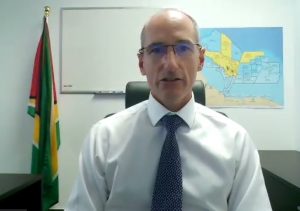
Alistair Routledge
August 27 ,2020
Underscoring the importance of contract sanctity to investors, ExxonMobil yesterday hinted that it was willing to discuss with government the local content areas it can give more to but drew the line at any renegotiation of the controversial 2016 Production Sharing Agreement (PSA).
“Contract sanctity is a fundamental principle of doing business worldwide, particularly in the oil and gas industry, to allow for certainty when making significant, long-term investments. The Government of Guyana has indicated that it will not renegotiate but will review the agreement,” newly-appointed President of ExxonMobil Guyana, Alistair Routledge yesterday told Stabroek News.
“We are open to having discussions to see where we can do more on areas such as local content. Our work and the support of the government are the basis of a long-term mutually-beneficial relationship for the development of oil resources while creating significant value for Guyanese,” he added.
As promised during its elections campaign, the PPP/C government says that it will not only undertake a review of the contract with ExxonMobil and partners in the Stabroek Block, but of all works in the oil & gas sector.
While President Irfaan Ali signalled a likely tougher stance on Exxon when he told this newspaper that the approval of the third of Exxon’s planned wells – Payara – will be put on hold for a review, his government has steered clear of expectations it will seek to change the widely condemned 2016 PSA.
ExxonMobil has told its investors and shareholders that both the last APNU+AFC government and the PPP/C when in opposition had promised to keep the contract “as is”.
Some analysts have suggested that government should use the Payara Project as leverage to push for a better contract, as when Guyana renegotiated in 2016, it was with a weak and inexperienced legal and technical team. In that renegotiation, this country was left with only a 2% royalty and other impositions which are seen as oppressive.
The company president said that he does not believe that the contract agreement gave the company a better deal than this country received, but the decision was taken on investment opportunities here because it was financially sound.
“I don’t believe that it is more in favour of ExxonMobil than it is the country. I think our interests are aligned. If the contract was more challenging for us, I don’t think, to be honest, I don’t think in this environment investment dollars would be coming to Guyana. It is a global business and these days where commodity prices have fallen, the investment dollars will flow to where it is competitive.”
“The Guyana portfolio is one of the better opportunities for us at ExxonMobil, it is not the only one. If we don’t get the agreement as we are looking for in Payara, the investment money will go elsewhere in ExxonMobil’s portfolio. I just don’t want it to be that this is a contract that is so far different from everything else that we can potentially invest,” he added.
Routledge said that his company has not yet had much discussion with government on a way forward, possibly because it is awaiting its review of the sector, but noted that they are aware of Vice President Bharrat Jagdeo’s posture that local content especially needs beefing up.
In his first press conference since appointed Vice President, Jagdeo whose job portfolio includes Office of the President oversight of the oil & gas sector, had said government has made clear to ExxonMobil its expectations and that the company has to show how this country will benefit from operations here tangibly.
While not saying if leveraging of the approvals for the Payara well will be a strategy to extract additional benefits for Guyana, Jagdeo said that ExxonMobil was told of the environmental concerns and local content commitments that will be mandatory.
“There are several issues we see as priority. We made it clear in the meetings with ExxonMobil that we want them to do well here; to make money, but Guyanese must share this prosperity. That it is not sustainable otherwise and we will insist that that happens. Guyanese must share the prosperity. If they are doing well, our people must do well, in terms of employment and opportunities…,” he declared.
“That will be the guiding principles and the policy with ExxonMobil and subsequently when we start looking at the other contracts. Several areas we have identified that can bring enormous benefits to our people,” he added.
Ensconced
Routledge explained that while it is easy for some persons to call for renegotiation of a contract, they do so from a perspective of not understanding investment strategies and the long term planning that goes into future investments of the projects ensconced in those agreements.
“We have had very little discussion with the government. What they have emphasised is that they will review the contracts but they are not seeking to [re]negotiate the contracts, and I think that’s really important for the country for the long term because international contract sanctity is very important to all oil companies,” he said.
Further, he added, “If we enter into contracts in a country and those are changed down the road, that is difficult for us to make when we have made investments 20 30 years down the line. How can we make those investments if we are unsure the contract will change? I think it is important that everybody understands that contract sanctity is important to everybody, not just ExxonMobil but any other investor.
And when asked what he felt was the purpose of the review if no change would be brought he said that it was to give each side an idea of what was expected and to assess if they were both meeting terms of the contract.
He suggested that from the review, there might be areas in local content that needs additional capacity building.
“To the point of what is the benefit of the review if there is no change, I think, the review informs so that everybody understands what is in the contract and what our obligations are and are we living up to those. It identifies what it is that is not in the contract that we can work on together, and I think local content is one of those areas where, while we have made a lot of progress, including initiatives like the Centre for Local Business Development that has done tremendous work… there is still much more that can be done,” he said.
“Part of me coming [to Guyana] is that I have a lot of energy in this respect to accelerate this with all of our contractors, our subcontractors, so we can all accelerate local content so that all Guyanese can feel the benefit from the oil industry as soon as possible. A great deal of that will be in the local content. Of course when the revenue really starts flowing through from the production as these projects come, everybody will really see the benefits,” he added.




